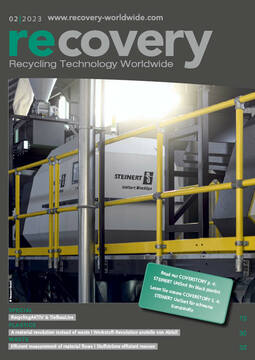Interview with Patrick Lindweiler, Product Manager and Key Account Manager in the Waste Processing and Recycling Division, STEINERT GmbH
On the subject of sorting black plastics, Patrick Lindweiler, Product Manager and Key Account Manager in the Waste Processing and Recycling Division, STEINERT GmbH was available for an interview with recovery Recycling Technology Worldwide magazine.
recovery: „Unfortunately, too few sorters still know that black plastics can be separated,“ says the STEINERT publication – that‘s where we want to start. How long have STEINERT sorting systems for black plastics/polyolefins been on the market?
Patrick Lindweiler: We have to distinguish between two things here:
UniSort Black, which separates black plastics as a mix, has been on the market for about a decade
UniSort BlackEye, for single-variety plastic fractions, which came onto the market two years after UniSort Black
recovery: Why is it difficult to sort black plastics?
Patrick Lindweiler: Black absorbs light completely, which is why the plastic looks black. And that‘s why no information, in our case spectrum, comes back – or at least very little. Carbon Black colored plastics are particularly affected by this. In the meantime, there are additives that reflect at least certain information, but they are still rarely used and are more expensive to produce.
recovery: What is special about the STEINERT sorting machines for black plastics?
Patrick Lindweiler: Our in-house developed Hyper Spectral Imaging (HSI) technology sees more information in the reflections. Even the low reflections of black plastics are sufficient to be able to determine the corresponding material compositions. The technology has been further developed over 10 years to date.
recovery: How did the cooperation with Otto Graf GmbH come about? Are there
any other joint projects in the future?
Patrick Lindweiler: GRAF was looking for a solution for black plastics. STEINERT UniSort Managing Director Bert Handschick was very committed to this project and did a lot of tests and found out that we have exactly the solution that Graf was looking for. The project is continuously optimized. GRAF‘s goal is to become more independent of market fluctuations and to increase the share of recycled plastics. We look back on a good and fruitful cooperation and are continuously pursuing a common path.
recovery: How do you see the future development of the plastics market – also with regard to the much-cited circular economy?
Patrick Lindweiler: Demand will increase and the demand will continue to grow. In order for demand to be saturated, more material will have to be recycled. And in order for the recycled plastic to be reused as a valuable material, the required qualities must be met. In addition, companies must meet the prescribed recycling quotas. The main purpose of this is to promote the sustainability of plastics. This is only possible with a functioning recycling economy.
recovery: ... and how do you see the future development of sorting machines, especially in the plastics sector? Has the practically possible already been achieved there?
Patrick Lindweiler: When the demands on qualities increase, the demands on those of our sorting systems also increase. We are not standing still, but are constantly looking for new solutions. We can become even better, and we have that aspiration.
recovery: I found the statement „Where else can you say that you buy a technology and the customer is offered directly with it?“ particularly interesting. Can you elaborate on that a bit?
Patrick Lindweiler: I can give a recent anonymous example there:
A chemical recycler wants a certain quality, but can‘t get it on the market. He turns to us with the aim of supporting his supplier in achieving the required quality. If we can meet this requirement, everyone benefits in the end and the sorter gets rid of his material securely for years. In addition, he can often offer his products at a lower price because he has to cross-finance less.
The chemical recycler, on the other hand, secures his raw material for years, and these business relationships are often based on solid ground through framework agreements and fixed revenues. The sorter is the link and we, as STEINERT GmbH, can establish the contact, because both are looking for strong, reliable partners to be able to fulfill their goals in the long term.

